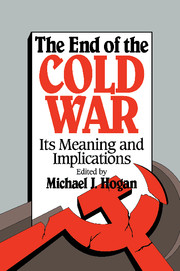Book contents
- Frontmatter
- Contents
- Preface
- The Authors
- Dedication
- 1 Introduction
- 2 An End to Which Cold War?
- 3 The Cold War, the Long Peace, and the Future
- 4 Quiet Cataclysm: Some Afterthoughts on World War III
- 5 Some Lessons from the Cold War
- 6 Nuclear Weapons and European Security during the Cold War
- 7 Victory in the Postwar Era: Despite the Cold War or Because of It?
- 8 The Wicked Witch of the West is Dead. Long Live the Wicked Witch of the East
- 9 The End and the Begining
- 10 A Balance Sheet: Lippmann, Kennan, and the Cold War
- 11 Why Did the Cold War Arise, and Why Did It End?
- 12 A View from Below
- 13 The End of the Cold War and the Middle East
- 14 The End of the Cold War in the Near East: What It Means for Historians and Policy Planners
- 15 After the Cold War: The United States, Germany, and European Security
- 16 The End of the Cold War: A Skeptical View
- 17 The End of the Cold War, the New Role for Europe, and the Decline of the United States
- 18 The Fading of the Cold War—and the Demystification of Twentieth-Century Issues
- 19 The U.S. Government, a Legacy of the Cold War
- 20 Foreign Policy, Partisan Politics, and the End of the Cold War
- 21 Beyond Bipolarity in Space and Time
- 22 A Usable Past for the Future
- Selective Bibliography
- Index
4 - Quiet Cataclysm: Some Afterthoughts on World War III
Published online by Cambridge University Press: 18 December 2009
- Frontmatter
- Contents
- Preface
- The Authors
- Dedication
- 1 Introduction
- 2 An End to Which Cold War?
- 3 The Cold War, the Long Peace, and the Future
- 4 Quiet Cataclysm: Some Afterthoughts on World War III
- 5 Some Lessons from the Cold War
- 6 Nuclear Weapons and European Security during the Cold War
- 7 Victory in the Postwar Era: Despite the Cold War or Because of It?
- 8 The Wicked Witch of the West is Dead. Long Live the Wicked Witch of the East
- 9 The End and the Begining
- 10 A Balance Sheet: Lippmann, Kennan, and the Cold War
- 11 Why Did the Cold War Arise, and Why Did It End?
- 12 A View from Below
- 13 The End of the Cold War and the Middle East
- 14 The End of the Cold War in the Near East: What It Means for Historians and Policy Planners
- 15 After the Cold War: The United States, Germany, and European Security
- 16 The End of the Cold War: A Skeptical View
- 17 The End of the Cold War, the New Role for Europe, and the Decline of the United States
- 18 The Fading of the Cold War—and the Demystification of Twentieth-Century Issues
- 19 The U.S. Government, a Legacy of the Cold War
- 20 Foreign Policy, Partisan Politics, and the End of the Cold War
- 21 Beyond Bipolarity in Space and Time
- 22 A Usable Past for the Future
- Selective Bibliography
- Index
Summary
In the last few years we seem to have experienced something like the functional equivalent of World War III. The recent pleasantness (as Winston Churchill might have called it) was preceded, like its unpleasant and far noisier predecessors of 1914 and 1939, by a lengthy process in which rival countries jockeyed for position as they proclaimed competitive visions of the way the world ought to be ordered, armed themselves to the earlobes, made threatening noises, and confronted each other in traumatic crises. Like World Wars I and II, a consequence of the event was that a major empire was dismembered, important political boundaries in Europe were reorganized, and several nations were politically transformed. And, just as the ancient institution of monarchy met its effective demise in Europe in World War I and as the newer, but dangerous and seemingly virile ideologies of nazism and fascism were destroyed by World War II, so a major political philosophy, communism, over which a great deal of ink and blood had been spilled, was discredited and apparently expunged in World War III.
Following World War I and II it took a few years for the basic political order to be settled, after which it remained substantially stable until revised by the next war (or war-equivalent). A similar process of shaking-out seems to be going on now in Eastern Europe and in the former Soviet Union—and perhaps also in China, where aged leaders are trying to counter an apparently inevitable historic process.
- Type
- Chapter
- Information
- The End of the Cold WarIts Meaning and Implications, pp. 39 - 52Publisher: Cambridge University PressPrint publication year: 1992
- 2
- Cited by



